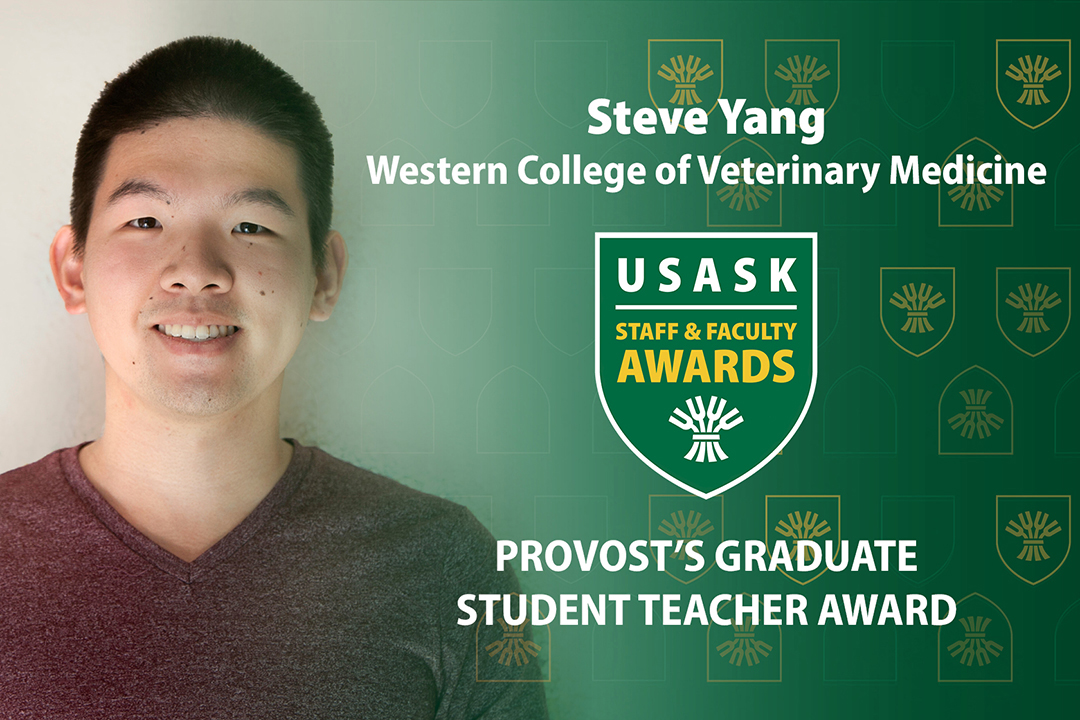
‘A first-rate, active learning guide’
While his research focus is on wildlife conservation and reproduction, Steve Yang has become a successful teacher of veterinary anatomy through his work with the Western College of Veterinary Medicine’s (WCVM) veterinary students.
By Jeanette NeufeldYang is a graduate student (PhD) in the Department of Veterinary Biomedical Sciences. In his graduate studies, Yang is working on improving assisted reproduction techniques in bison with supervisors Drs. Muhammad Anzar and Gregg Adams.
He works as a teaching assistant in the veterinary anatomy course and was recently awarded the 2022 Provost’s Graduate Student Teacher Award for this work.
This annual award is given to a graduate student at any stage in their studies who has taught or assisted teaching for at least one academic term.
As described by his nominees, Yang consistently earns high scores in student evaluations and has been commended by his supervisors for his dedication to teaching labs. His commitment was especially noticeable during the first year of the COVID-19 pandemic when he taught his labs four times as often to facilitate smaller cohorts of veterinary students.
While he’s not a veterinarian by training, Yang has worked hard to understand and demonstrate to students how the anatomy they learn in labs will be relevant to clinical practice.
“During his tenure as a gross anatomy demonstrator, Steve has spent innumerable hours in the lab performing student dissections to ensure that he possesses the requisite first-hand experience to function as a first-rate active learning guide,”wrote Dr. Brent Bobick (PhD), director of the WCVM’s anatomy lab.
Yang was born in China and completed secondary education in Calgary, Alta. After completing a Bachelor of Sciences (Honours) degree at the University of Toronto, he was drawn to the opportunity to work in bison conservation and began his master’s degree at the WCVM in 2014. Yang moved on to a PhD program in 2018.
Yang’s research work is focused on applying techniques for assisted reproduction toward bison, which present a variety of unique challenges for reproduction specialists.
Q & A with Steve Yang
What motivates, inspires or excites you about your work?
The most exciting part of my work is being on the verge of this great breakthrough to save the future of bison. Bison are emblematic animals of North America, and unfortunately, wild populations are threatened by limited genetic diversity and endemic diseases such as tuberculosis and brucellosis.
We have been developing reproductive techniques to extract germplasm and propagate disease-free animals over the past few years. We’re now at a point where we are confident of our techniques and are working to implement them in the field. These findings have huge implications for bison conservation since there will be an exchange of genetic material between herds that have been isolated from each other for over 100 years, and we will be able to eliminate these endemic diseases. The multitude of challenges to overcome with bison conservation keep me on my toes and keep me moving forward.
Tell us about a mentor or supporter who made an impact on your career.
Brent Bobick, a lecturer at the WCVM, has been a wonderful mentor and friend. Anatomy is a challenging subject and akin to learning a new language. Brent provides students with all the resources they need to succeed and breaks down big ideas into manageable pieces. He goes the extra mile to ensure that anatomy is not just about memorization, but it’s about understanding how something came to be, and relate it to students’ previous experiences so they can better grasp difficult concepts.
Throughout the years I have worked with Brent, he has created a relaxed, interactive, and humorous learning environment for the students which allowed for each student to learn at their own pace and become critical thinkers, capable of approaching problems from different angles.
Brent has led me by being an example of what a great mentor would do. He has always been supportive in my growth to become a better teacher, and I am grateful for the extra time he takes out of his day to ensure that I am prepared to face each lab.
What is one piece of advice that you would give to students, colleagues or others in your field?
Always keep an open mind and be willing to learn from others. When it comes to research, it is important to look at what others are doing as there are different ways to approach the same problem. You will always be able to find new and exciting ideas from other bright minds in your field. By learning from others, you will be able to incorporate their strengths into your own research.
When it comes to teaching, it’s just as important that you learn from other colleagues and also from students as they learn from you. I have had the pleasure to work with various mentors with different teaching techniques — ways that I wouldn’t have thought of on my own — and I have become a better teacher as I learn from them.
It is also critical to listen to the feedback from the students. Each student has their own unique way of learning, and you can adapt your teaching style to better aid their learning process. It is easy to get stuck in one way of doing things, and I think it’s important to keep an open mind to be able to grow as a researcher and teacher